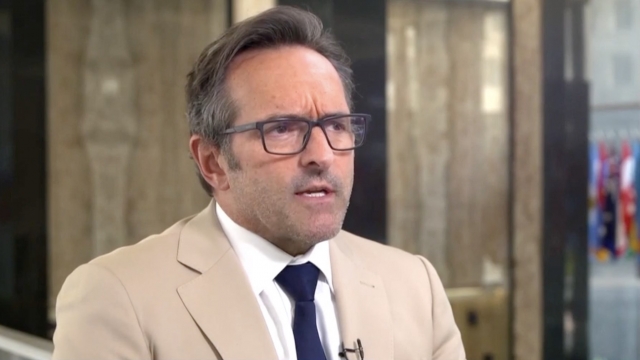Roger Carstens, the Special Presidential Envoy for Hostage Affairs, is the top U.S. official negotiating for the release of Evan Gershkovich. We sat down with him at the U.S. State Department just after a Moscow court held a secretive hearing for the Wall Street Journal reporter.
SCRIPPS NEWS' SASHA INGBER: What did embassy personnel who attended that hearing have to say about Evan's condition?
SPECIAL PRESIDENTIAL ENVOY FOR HOSTAGE AFFAIRS ROGER CARSTENS:You know, overall, that I wouldn't want to go into too much detail just due to privacy concerns. But they did say that Evan looked strong and he looked resilient. What I can tell you is that we understand he did smile, but you're looking from a distance. Our sense is that he's remained very strong while in prison.
Russia has denied U.S. requests for consular access to Gershkovich twice, but the team will try again in a few days. And Carstens says that former U.S. Marine Paul Whelan, who has been imprisoned in Russia since 2018 on espionage charges, calls him often, is aware of Gershkovich's arrest — and has asked him about Gershkovich's case.
"Paul has been tracking, he is allowed to watch a little bit of TV and get news from his parents," Carstens said. "This is something that Paul's concerned about, not just because he's in the same boat, but as a human being."
INGBER: Can the Biden administration afford to get out one person at a time now, or do Paul and Evan need to be released together?
CARSTENS: Well, you can imagine we're trying to get Paul and Evan released together. That's going to be what we're striving for. That's what the president, I'm sure, wants, the Secretary of State wants. So we're going to go into battle with the Russians here and have this negotiation and see what we can get done.
Gershkovich's arrest at the hands of Russia's domestic security service, the FSB, and the ensuing case have been shrouded in mystery, with Russian media reporting that material has been stamped "secret."
INGBER: Are you aware of the FSB's purported evidence that Evan was spying? There are so few details that we know about this case.
CARSTENS: You know, I think you pointed out there are so few details that we know about this case. It's concerning and disturbing. We would like to get some more information, frankly. But right now, I just don't think there is going to be information. To our mind, Evan is a journalist and he's innocent.
INGBER: Does not having details of this case make it harder to negotiate?
CARSTENS: Yes and no. I mean, every time you can bring in information to a case, it might alter your approach or give you a maybe a foot up on trying to deal with the other side. But at the end of the day, my job is to take the cards where they lay and play the hand that I've been given.
SEE MORE: Russia extends detention of US journalist Gershkovich by 3 months
To protect U.S. efforts, Carstens wouldn't discuss the details of negotiations or possible demands by the Russians — including trading wrongfully detained Americans with Russian spies who have been arrested for operating without diplomatic cover.
INGBER: We've seen an alarming number of Russian so-called illegals be identified and be arrested. Is that on the table?
CARSTENS: It's probably better I don't get into any specifics of what we are trying to do or what might be on the table.
INGBER: Can you just tell me if it's something that would be ruled out?
CARSTENS: We're open to a lot of things. I mean, you've seen some of the other people that have come home in the last two years. The president's made some pretty tough decisions in order to bring those Americans home.
With Gershkovich yet to stand trial, Carstens cautions that the process could take a while.
"If they are going to put him through a trial process, who knows how long that could go? It could go 12 months, 13 months, 14 months," Carstens said. "But it's our hope that we don't have to go that far."
SEE MORE: Putin may want to swap an 'illegal' Russian spy for Evan Gershkovich
Trending stories at Scrippsnews.com



